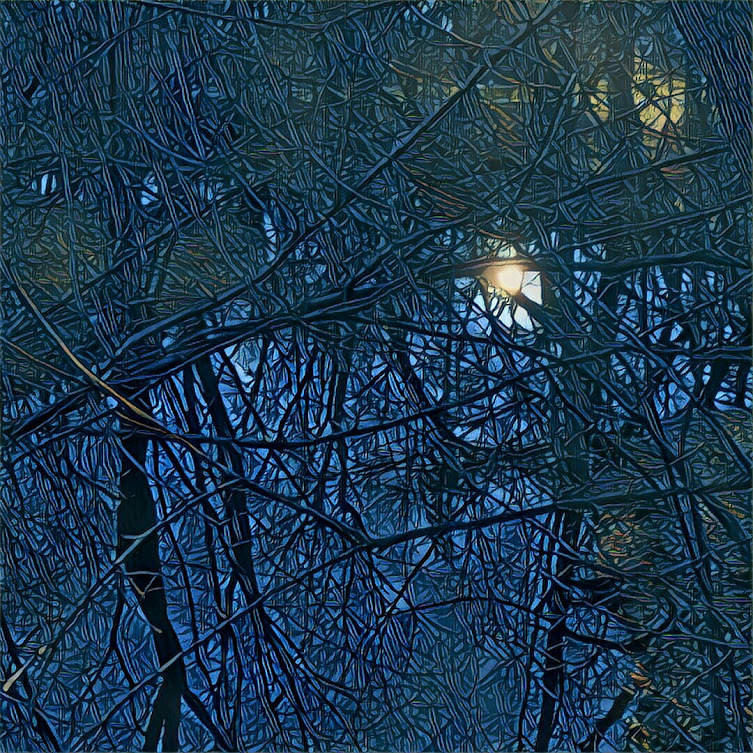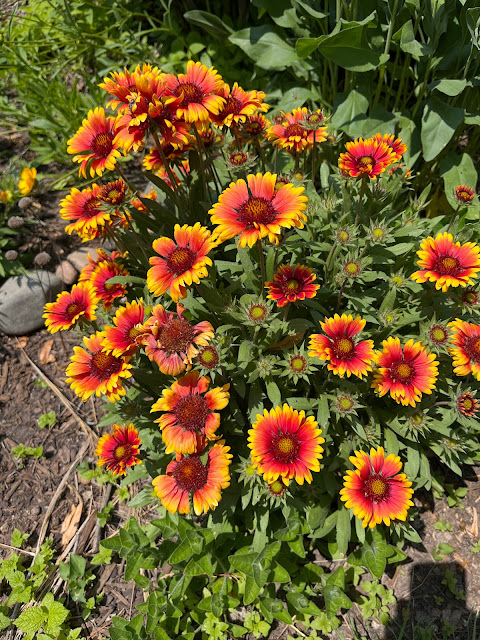Stealing from the chickadees and catbirds, I swallow a handful of velvet-blue June berries. I eat tiny, ripe rubies of strawberries, where they hang in clusters amid leaves curling up under the rays of the mighty midsummer sun. A star god fully visible in the northern sky.
As I eat this warm fruit I imagine swallowing the sun, and the rain, and the seeds of life shaped to grow more June berries, more strawberries.
In the midsummer, finches and robins, sparrows and cowbirds unite in scolding roaming cats, and cicadas buzz in chorus for the first time under the sun.
A marauding, spotted cat with a pink collar has chewed down the catnip I grow for Juniper and Murphy. A judicious application of chicken wire later, we'll see who wins this battle.
Blooming in my native plant garden: blanket flower, purple prairie clover, hoary vervain, swamp milkweed. Butterfly weed, harebells, anise hyssop, pale purple coneflower. Purple poppy mallow, New Jersey Tea, wild petunia, and Canada anemone.
Purple coneflower and summertime are just beginning to unfurl their tossing petals.
I dispense water to their roots, tend to their drooping and injuries.
I pluck out roaming seedlings, murmur greetings to the plants in their happy, green growth and flowering in the cool of the mornings.
I took a weeklong naturalist course on the ecoregion where I live, which is called the Big Woods, or alternately, Eastern Broadleaf Forest.
How would you define a naturalist, I wonder? I think of this as someone who habitually pays attention to the natural world. My textbook on natural history says a naturalist "studies" the natural world, which is more rigorous.
I like learning my share of "facts." But even more interesting are the facts-as-metaphors.
For example. Did you know that it is the nature of rock to be cyclic? Not fixed? Rock forms are dynamic, always in process and transition; similar to every other being and landform — but with their own ways of being, of course.
They are never done changing, as long as the Earth itself is alive. Like us.
Learning this sort of "fact as truth" makes me feel a kinship with rocks. It is another strand in the web of meaning and mystery that connects us all. It gets at truth in a rather meandering, sideways process; one that creates meaning from the perspective of the whole.
This is different from one philosophy of science that I hope does not exist anymore — one that destroys or pulls something apart in order to understand how it works.
One of the instructors in our course joked that their students tend to be either "plant people" or "bird people." I know more about plants than birds, but refuse to be sorted into one category. Birds and other animals, oceans, mountains, deserts, volcanoes, glaciers, stars...all fascinating (though difficult to experience in my own backyard, unlike plants).
Though an elder woman, I am yet a young naturalist.*
With new binoculars and the help of the Merlin birding app, I now have a (admittedly slim) chance of seeing woodland or grassland birds when I hear them singing their songs.
Spotting an Eastern meadowlark or an Ovenbird makes me feel like part of a rarified club, somehow. Though humans have lived with these species for thousands of years, a relatively small percentage of people go out seeking bird sightings.
It takes patience. With my untrained eye I need to search a while before I find the bird that I hear, so the bird needs to stay in one area so I can zero in. When I do find a bird, I am enchanted to see how they sing with their whole bodies — throats vibrating, beaks open wide. It is somehow relaxing, as if I relax into their wildness, their vibrant, singing presence.
Today, on the solstice, it is still early summer here. Yet it feels like July. There is an air quality alert due to ozone and wildfire smoke. We are feeling moderate drought once again. 90-degree temperatures again, with more to follow. Is this summer from now on? Earth is "quite sick" now, reports say.
They also say it is not too late to heal her. We know what to do. Now, "we" just need the will to do what needs to be done.
Anyway, as I look at the burgeoning green beings around me on midsummer day, how I wish I could shoot up as they do in the strong sunlight, and make the most of my growing in the short season of sun, blossoming and fruiting.
This short season we are given on Earth.
For better or worse, I am a spring-blooming flower. I wither, and always have, in hot weather. How sad though, to only feel I can flourish in the coolness of spring and autumn—two brief seasons.
I remember too when it was different — not very long ago at all — in this climatescape where I have lived for all my life, and which I struggle to recognize anymore.
In May, and well into June, the days here were cooler, rainier — so that when midsummer burst upon us, in a dazzle of sun and warm greenness, it felt like the dancing times, the singing times at last were here.
I miss that time.
Once, someone told me her one-line poem that she had never told anyone else, and it was, "I feel lonely for when the Earth was okay."
Then we felt lonely together, and that made it a little less lonely.
Sadness silences me. Anger silences me. Grief and loss silence me. Loneliness silences me. Fear of sounding ungrateful, whiny, privileged, sorry for myself, negative — all combine into the perfect silencing potion.
I am writing anyway. I need to do things anyway. Because it is always the right time to be here, and to be who you are, even when it doesn't conform to societal expectations.
In my effort to acknowledge the positive...yes, it is hot, but not humid.
There is a breeze.
It is "date night."
I am getting together with friends on Friday.
There is pudding in the refrigerator.
And, despite all of my laments, it is green and flourishing still, on the summer solstice, here in this tiny, blooming patch of former oak savanna, in the Mississippi River watershed, of the land called Where the Waters Reflect the Clouds.
*"Though an old man, I am but a young gardener." —Thomas Jefferson


